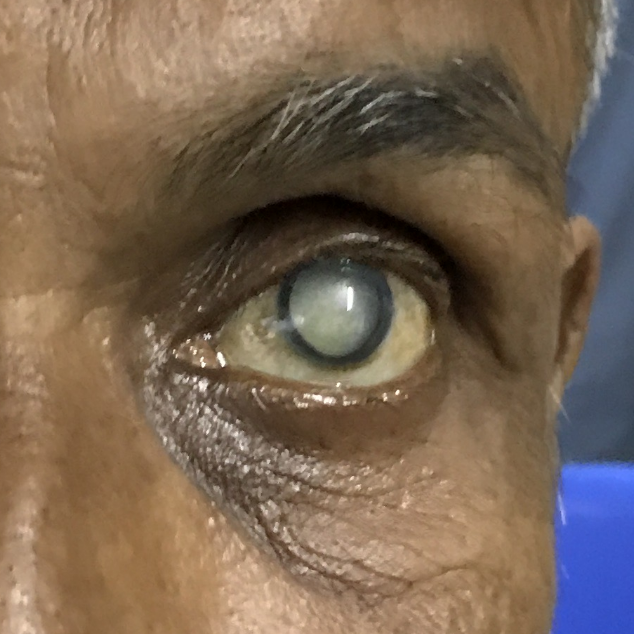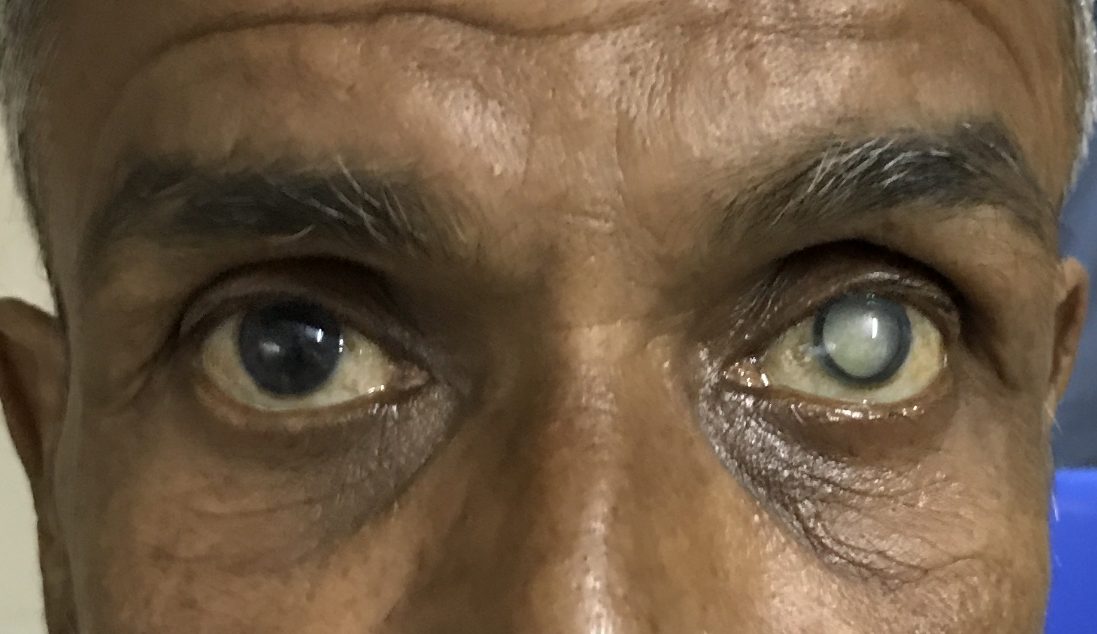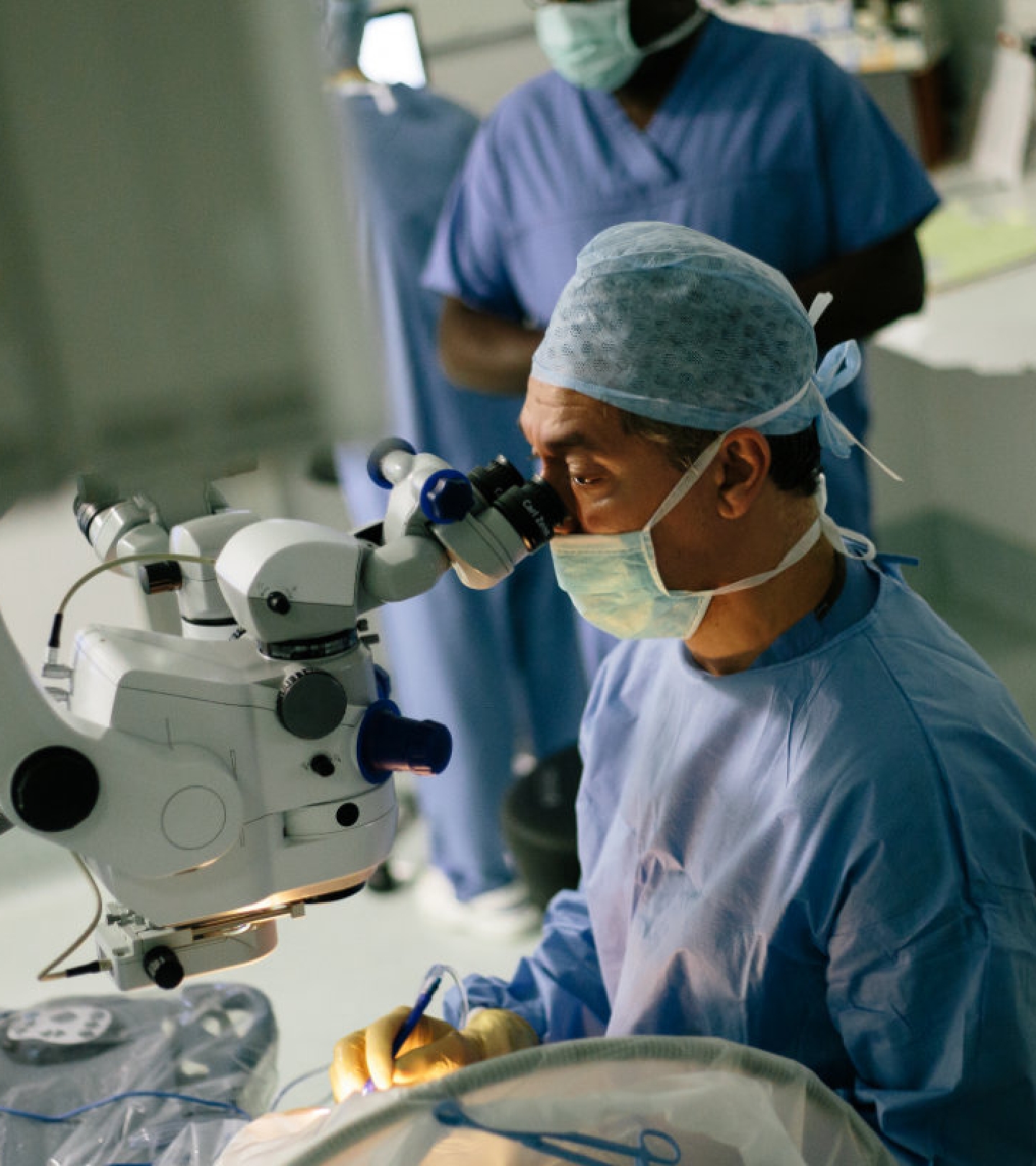
Cataract Surgery
Consultant-led treatment from Mr Hooman Sherafat, with precision care and personal support at every step.
Book a Consultation Scroll to learn more

Overview
Cataract Surgery at The London Eye Clinic
Cataracts are a common part of ageing, but they don’t have to affect your quality of life. At The London Eye Clinic, Mr Hooman Sherafat offers precise, consultant-led cataract surgery using advanced techniques and personalised care, helping you see clearly, comfortably, and confidently once again.
Symptoms
Reason You Might Consider Cataract Surgery
- Cloudy, blurry or dim vision
- Difficulty with night driving
- Increased sensitivity to light
- Fading or yellowing of colours

About
About Cataracts

What is a cataract?
The best way to understand a cataract is to have an understanding of the structure of the eye.
The front of the eye is covered by clear structures i.e. the cornea and the crystalline lens, which together bring the image to a sharp focus on the retina, which lines the inside of the back of the eye.
The best way is to think of the eye is as a cinema, where the cornea and the lens are the projectors and the flat retina on which the image is focused is the cinema screen.
Whilst the cornea has a fixed curvature and shape, the lens is able to change its shape to bring objects of different distances to a sharp focus on the retina. A cataract is a condition where the lens of the eye loses its clarity and thus either prohibits light from passing through or misdirects light rays, thereby interfering with the projection of a bright and sharp image on the retina.
What is the treatment for cataracts?
The only definitive treatment for cataract is exchanging the lens of the eye with an artificial lens implant. This is what is referred to as cataract surgery or cataract extraction. Occasionally when symptoms are very mild you may find that spectacles temporarily resolve the symptoms.
Treatment
Information on the procedure
Cataract surgery involves removal of the crystalline lens (cataract) and replacing it with a clear artificial lens implant. It is normally carried out under a local anaesthetic as a daycase procedure with the patient being awake during the surgery.
After the pupil is dilated with eye drops and the eye is anaesthetised, a small (2-2.5 mm) self-sealing incision (opening) is made on the periphery of the cornea. A section of the thin capsular bag enclosing the lens is opened and peeled off. A fine ultrasonic probe is inserted into the eye, through the incision and used to fragment the lens into fine particles, which are simultaneously washed out of the eye. Once all the lens matter is removed an artificial lens is implanted into the empty capsular bag. Normally there is no need to use stitches. The artificial lens can stay in place indefinitely.
What happens in consultation?
You will undergo a full ophthalmic history and assessment to ensure your cataract is the main caue for your visual deterioration and to rule out or identify other co-existing causes for your symptoms. This includes measurements called biometry, which enable selection of the appropriate lens power, by Mr Sherafat. There are different types of lenses (monofocal, toric, multifocal) designed to meet patients different lifestyles and needs and during the consultation these options and pros and cons of all are discussed.

Patient Journey
What you can expect under our care

Consultation & Examination
You will undergo a full ophthalmic history and assessment to ensure your cataract is the main caue for your visual deterioration and to rule out or identify other co-existing causes for your symptoms.
Your Procedure
Cataract surgery involves removal of the crystalline lens (cataract) and replacing it with a clear artificial lens implant. It is normally carried out under a local anaesthetic as a daycase procedure with the patient being awake during the surgery.
Recovery & Follow-up
If the vision in the unoperated eye is poor, then it would be advised that you have some-one with you for the first 48 hours after surgery. You will be provided with eye drops which you usually use up to 4 times daily.
Frequently Asked Questions
Common questions we are asked
Got a question that’s not covered here?
Just get in touch with our friendly team we’re happy to help and always here to talk through your options.
Contact us- Please bring you latest (current) distance and near spectacles
- Please bring any referral letter from your optician and your latest spectacle prescription, if available
- Please refrain from wearing your soft contact lenses for at least one week and hard contact lenses for two weeks prior to your consultation to ensure accurate lens implant power calculations are carried out on the same day. This is to avoid subsequent delays pending contact lens wear omission.
- Please do not drive to your appointment on the day, because your pupil will be dilated during the consultation and this can blur your vision.
Cataract surgery is a very safe procedure with generally very high patient satisfaction rate. Even so, no surgery is ever risk free. Complications which can adversely affect the visual outcome can occur during surgery or post-operatively.
Whilst the list of specific causes for these complications is long, the overall incidence is a small fraction of cases. The most serious complications during surgery are a tear of the thin capsule at the back of the lens (posterior capsule rupture) or spontaneous haemorrhage from the thin vessels in the deeper layer of the retina. The most serious post-operative complications are retinal detachment, which is more common in very short-sighted eyes or younger patients (under 50s), infection (1-2/1000). Overall there is a reported 1 in 1000 chance of loss of vision and 1 in 10000 chance of losing the eye.
No. The final visual outcome is not dependent on the time of intervention and therefore cataract surgery is not regarded as a time-critical intervention. The most important factor determining the need for surgery is whether you are troubled by your visual symptoms. If you are satisfied with your level of vision, then you do not need to have cataract surgery just because you have a cataract and you can choose to defer the option of surgery. Sometimes glasses can offer some improvement in vision during early cataracts, but this improvement may be limited and more short-lived as the cataract progresses.
There are however exceptions where cataract surgery is recommended even though you may not wish to have surgery or are not troubled by your vision. These are:
- If your best vision, even with glasses or contact lenses, does not meet the legal minimum requirements for driving and you wish to continue to drive.
- If the cataract prohibits an adequate view to enable monitoring or treating the back of the eye (retina), for example in diabetic patients who can develop changes in the back of the eye (diabetic retinopathy).
If the vision in the unoperated eye is poor, then it would be advised that you have some-one with you for the first 48 hours after surgery. You will be provided with eye drops which you usually use up to 4 times daily.
You can commence work as soon as you can provided this is not heavy duty manual work or risks exposure to trauma or dust.
Do not:
- Drive until your vision has cleared and you feel comfortable to do so
- Do any heavy lifting or vigorous activity for two weeks.
- Squeeze your eyes for 2 days after surgery
- Wear eye make-up for one week.
- Swim until your next review
- Wet your eyes for one week
- shower on the day of surgery. Do keep your eyes closed when showering for one week following surgery
- Travel by air for one week following surgery
- Can I wear glasses my old glasses after surgery?
Most of the visual recovery in the operated eye can take 24-72 hours. You can wear your glasses, especially if you need them for the unoperated eye, whilst awaiting for the vision for the operated eye to clear. Remember the prescription will be different and don’t judge your vision in the operated eye with your old glasses. Wearing the old prescription will not however cause any harm to the operated eye, but obviously not offer the clearest vision. Alternatively, you can remove the lens from the frame of the operated eye.
You can fly after one week, but it would be recommended that if you remain within reach of the practice for the first week and preferably two.
Simply visit our contact page and use any of the methods on that page to contact us to get a consultation booked in at a time and location to suit you.
Ready to book a consultation?
Whether you’re looking for more information or want to take the next step, our friendly team is here to help and happy to talk things through with you.
Contact us
"*" indicates required fields
Why Choose Us
Reasons Our Patients Trust Us with their eyes.
Our patients know that they are cared for and listened to. We take the time to provide clear information about all available options, along with the benefits and risks of each. This approach gives every patient the confidence to make informed choices about their treatment, knowing they are supported every step of the way.
Putting the patient first
At The London Eye Clinic, patient care is at the heart of everything we do. Hooman is known for his caring, transparent approach, taking the time to understand each person’s individual needs and creating treatment plans that are compassionate, thorough, and patient-centred . From leading the Best Interest Ophthalmology Service for patients with learning difficulties to offering clear guidance on surgical and non-surgical options, his focus is always on doing what’s right for the patient.
Advanced eye care treatment
With extensive training at leading London hospitals, including St George’s, Guy’s and St Thomas’, and Moorfields. Hooman brings advanced expertise in oculoplastic, lacrimal, and reconstructive surgery alongside general ophthalmology. The London Eye Clinic offers a wide range of treatments, from cataract operations to delicate eyelid procedures, delivered with the latest techniques and the highest standards of care. Whether routine or complex, every treatment is carried out with precision and attention to detail.
Over 20 years of experience
Since qualifying in 1992, Hooman has gained over two decades of experience treating thousands of patients. His work is recognised not only in the UK but also internationally, performing cataract operations in Ghana, Bangladesh, and Burma, and being invited to the House of Lords in recognition of his support for the visually impaired. This depth of experience gives patients confidence that they are in safe, capable hands.

Testimonials
What Are Patients Saying?
Real stories from patients who trusted their eyes to Hooman Sherafat.
